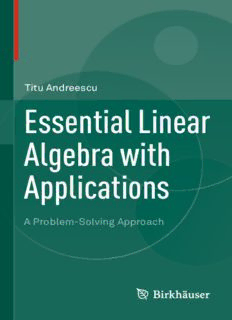Table Of ContentTitu Andreescu
Essential Linear
Algebra with
Applications
A Problem-Solving Approach
Titu Andreescu
Essential Linear Algebra
with Applications
A Problem-Solving Approach
TituAndreescu
NaturalSciencesandMathematics
UniversityofTexasatDallas
Richardson,TX,USA
ISBN978-0-8176-4360-7 ISBN978-0-8176-4636-3(eBook)
DOI10.1007/978-0-8176-4636-3
SpringerNewYorkHeidelbergDordrechtLondon
LibraryofCongressControlNumber:2014948201
MathematicsSubjectClassification(2010):15,12,08
©SpringerScience+BusinessMediaNewYork2014
Thisworkissubjecttocopyright.AllrightsarereservedbythePublisher,whetherthewholeorpartof
thematerialisconcerned,specificallytherightsoftranslation,reprinting,reuseofillustrations,recitation,
broadcasting,reproductiononmicrofilmsorinanyotherphysicalway,andtransmissionorinformation
storageandretrieval,electronicadaptation,computersoftware,orbysimilarordissimilarmethodology
nowknownorhereafterdeveloped.Exemptedfromthislegalreservationarebriefexcerptsinconnection
with reviews or scholarly analysis or material supplied specifically for the purpose of being entered
and executed on a computer system, for exclusive use by the purchaser of the work. Duplication of
this publication or parts thereof is permitted only under the provisions of the Copyright Law of the
Publisher’slocation,initscurrentversion,andpermissionforusemustalwaysbeobtainedfromSpringer.
PermissionsforusemaybeobtainedthroughRightsLinkattheCopyrightClearanceCenter.Violations
areliabletoprosecutionundertherespectiveCopyrightLaw.
Theuseofgeneraldescriptivenames,registerednames,trademarks,servicemarks,etc.inthispublication
doesnotimply,evenintheabsenceofaspecificstatement,thatsuchnamesareexemptfromtherelevant
protectivelawsandregulationsandthereforefreeforgeneraluse.
While the advice and information in this book are believed to be true and accurate at the date of
publication,neithertheauthorsnortheeditorsnorthepublishercanacceptanylegalresponsibilityfor
anyerrorsoromissionsthatmaybemade.Thepublishermakesnowarranty,expressorimplied,with
respecttothematerialcontainedherein.
Printedonacid-freepaper
SpringerispartofSpringerScience+BusinessMedia(www.birkhauser-science.com)
Preface
This textbook is intended for an introductory followed by an advanced course in
linear algebra, with emphasis on its interactions with other topics in mathematics,
such as calculus, geometry, and combinatorics. We took a straightforward path to
themostimportanttopic,linearmapsbetweenvectorspaces,mostofthetimefinite
dimensional. However, since these concepts are fairly abstract and not necessarily
natural at first sight, we included a few chapters with explicit examples of vector
spaces such as the standard n-dimensional vector space over a field and spaces of
matrices.Webelievethatitisfundamentalforthestudenttobeveryfamiliarwith
these spaces before dealing with more abstract theory. In order to maximize the
clarity of the concepts discussed, we included a rather lengthy chapter on 2 (cid:2) 2
matrices and their applications, including the theory of Pell’s equations. This will
helpthestudentmanipulatematricesandvectorsinaconcretewaybeforedelving
intotheabstractandverypowerfulapproachtolinearalgebrathroughthestudyof
vectorspacesandlinearmaps.
The first few chapters deal with elementary properties of vectors and matrices
and the basic operations that one can perform on them. A special emphasis is
placed on the Gaussian Reduction algorithm and its applications. This algorithm
provides efficient ways of computing some of the objects that appear naturally in
abstract linear algebra such as kernels and images of linear maps, dimensions of
vector spaces, and solutions to linear systems of equation. A student mastering
this algorithm and its applications will therefore have a much better chance of
understanding many of the key notions and results introduced in subsequent
chapters.
Thebulkofthebookcontainsacomprehensivestudyofvectorspacesandlinear
mapsbetween them.Weintroduce anddevelop thenecessarytoolsalongtheway,
bydiscussingthemanyexamplesandproblemsproposedtothestudent.Weoffera
thoroughexpositionofcentralconceptsinlinearalgebrathroughaproblem-based
approach.Thisismorechallengingforthestudents,sincetheyhavetospendtime
trying to solve the proposed problems after reading and digesting the theoretical
v
vi Preface
material. In order to assist with the comprehension of the material, we provided
solutions to all problems posed in the theoretical part. On the other hand, at the
end of each chapter, the student will find a rather long list of proposed problems,
for which no solution is offered. This is because they are similar to the problems
discussed in the theoretical part and thus should not cause difficulties to a reader
whounderstoodthetheory.
Wetrulyhopethatyouwillhaveawonderfulexperienceinyourlinearalgebra
journey.
Richardson,TX,USA TituAndreescu
Contents
1 MatrixAlgebra ............................................................. 1
1.1 Vectors,Matrices,andBasicOperationsonThem ................. 3
1.1.1 ProblemsforPractice....................................... 10
1.2 MatricesasLinearMaps............................................. 11
1.2.1 ProblemsforPractice....................................... 14
1.3 MatrixMultiplication ................................................ 15
1.3.1 ProblemsforPractice....................................... 26
1.4 BlockMatrices ....................................................... 29
1.4.1 ProblemsforPractice....................................... 31
1.5 InvertibleMatrices ................................................... 31
1.5.1 ProblemsforPractice....................................... 41
1.6 TheTransposeofaMatrix........................................... 44
1.6.1 ProblemsforPractice....................................... 51
2 SquareMatricesofOrder2 ............................................... 53
2.1 TheTraceandtheDeterminantMaps............................... 53
2.1.1 ProblemsforPractice....................................... 56
2.2 The Characteristic Polynomial and the
Cayley–HamiltonTheorem.......................................... 57
2.2.1 ProblemsforPractice....................................... 65
2.3 ThePowersofaSquareMatrixofOrder2.......................... 67
2.3.1 ProblemsforPractice....................................... 70
2.4 ApplicationtoLinearRecurrences.................................. 70
2.4.1 ProblemsforPractice....................................... 73
2.5 SolvingtheEquationXn DA....................................... 74
2.5.1 ProblemsforPractice....................................... 78
2.6 ApplicationtoPell’sEquations...................................... 79
2.6.1 ProblemsforPractice....................................... 83
vii
viii Contents
3 MatricesandLinearEquations........................................... 85
3.1 LinearSystems:TheBasicVocabulary ............................. 85
3.1.1 ProblemsforPractice....................................... 87
3.2 The Reduced Row-Echelon form and Its
RelevancetoLinearSystems ........................................ 88
3.2.1 ProblemsforPractice....................................... 95
3.3 SolvingtheSystemAX Db ........................................ 96
3.3.1 ProblemsforPractice....................................... 99
3.4 ComputingtheInverseofaMatrix.................................. 100
3.4.1 ProblemsforPractice....................................... 105
4 VectorSpacesandSubspaces.............................................. 107
4.1 VectorSpaces-Definition,BasicPropertiesandExamples......... 107
4.1.1 ProblemsforPractice....................................... 113
4.2 Subspaces............................................................. 114
4.2.1 ProblemsforPractice....................................... 121
4.3 LinearCombinationsandSpan...................................... 122
4.3.1 ProblemsforPractice....................................... 127
4.4 LinearIndependence................................................. 128
4.4.1 ProblemsforPractice....................................... 133
4.5 DimensionTheory.................................................... 135
4.5.1 ProblemsforPractice....................................... 146
5 LinearTransformations.................................................... 149
5.1 DefinitionsandObjectsCanonicallyAttachedtoaLinearMap... 149
5.1.1 Problemsforpractice....................................... 157
5.2 LinearMapsandLinearlyIndependentSets........................ 159
5.2.1 Problemsforpractice....................................... 163
5.3 MatrixRepresentationofLinearTransformations.................. 164
5.3.1 Problemsforpractice....................................... 181
5.4 RankofaLinearMapandRankofaMatrix........................ 183
5.4.1 Problemsforpractice....................................... 194
6 Duality ....................................................................... 197
6.1 TheDualBasis ....................................................... 197
6.1.1 ProblemsforPractice....................................... 208
6.2 OrthogonalityandEquationsforSubspaces ........................ 210
6.2.1 ProblemsforPractice....................................... 218
6.3 TheTransposeofaLinearTransformation ......................... 220
6.3.1 ProblemsforPractice....................................... 224
6.4 ApplicationtotheClassificationofNilpotentMatrices............ 225
6.4.1 ProblemsforPractice....................................... 234
7 Determinants................................................................ 237
7.1 MultilinearMaps..................................................... 238
7.1.1 ProblemsforPractice....................................... 242
Contents ix
7.2 Determinant of a Family of Vectors, of a Matrix,
andofaLinearTransformation...................................... 243
7.2.1 ProblemsforPractice....................................... 251
7.3 MainPropertiesoftheDeterminantofaMatrix.................... 253
7.3.1 ProblemsforPractice....................................... 262
7.4 ComputingDeterminantsinPractice................................ 264
7.4.1 ProblemsforPractice....................................... 278
7.5 TheVandermondeDeterminant ..................................... 282
7.5.1 ProblemsforPractice....................................... 287
7.6 LinearSystemsandDeterminants................................... 288
7.6.1 ProblemsforPractice....................................... 298
8 PolynomialExpressionsofLinearTransformationsandMatrices ... 301
8.1 SomeBasicConstructions........................................... 301
8.1.1 ProblemsforPractice....................................... 303
8.2 TheMinimalPolynomialofaLinearTransformationorMatrix .. 304
8.2.1 ProblemsforPractice....................................... 309
8.3 EigenvectorsandEigenvalues ....................................... 310
8.3.1 ProblemsforPractice....................................... 316
8.4 TheCharacteristicPolynomial....................................... 319
8.4.1 ProblemsforPractice....................................... 330
8.5 TheCayley–HamiltonTheorem..................................... 333
8.5.1 ProblemsforPractice....................................... 337
9 Diagonalizability ........................................................... 339
9.1 Upper-TriangularMatrices,OnceAgain............................ 340
9.1.1 ProblemsforPractice....................................... 343
9.2 DiagonalizableMatricesandLinearTransformations.............. 345
9.2.1 ProblemsforPractice....................................... 356
9.3 SomeApplicationsofthePreviousIdeas ........................... 359
9.3.1 ProblemsforPractice....................................... 372
10 Forms ........................................................................ 377
10.1 BilinearandQuadraticForms ....................................... 378
10.1.1 ProblemsforPractice....................................... 389
10.2 Positivity,InnerProducts,andtheCauchy–SchwarzInequality... 391
10.2.1 PracticeProblems........................................... 397
10.3 BilinearFormsandMatrices......................................... 399
10.3.1 ProblemsforPractice....................................... 406
10.4 DualityandOrthogonality........................................... 408
10.4.1 ProblemsforPractice....................................... 416
10.5 OrthogonalBases..................................................... 418
10.5.1 ProblemsforPractice....................................... 436
10.6 TheAdjointofaLinearTransformation ............................ 442
10.6.1 ProblemsforPractice....................................... 448
10.7 TheOrthogonalGroup............................................... 450
10.7.1 ProblemsforPractice....................................... 465
Description:Rooted in a pedagogically successful problem-solving approach to linear algebra, the present work fills a gap in the literature that is sharply divided between elementary texts and books that are too advanced to appeal to a wide audience. It clearly develops the theoretical foundations of vector spa

